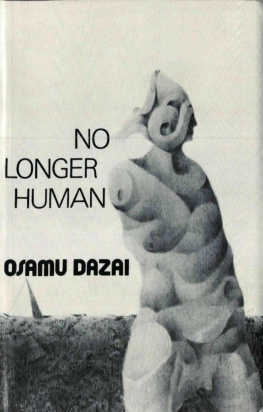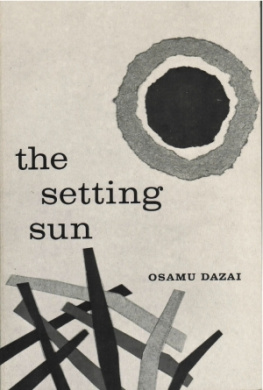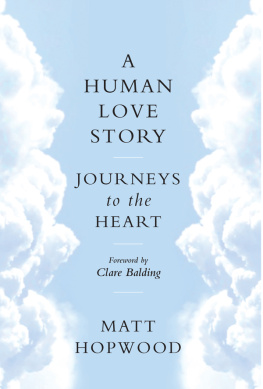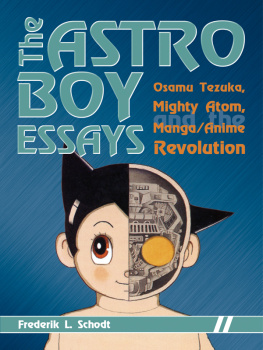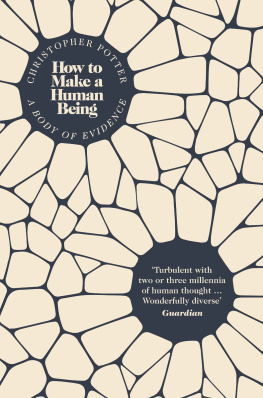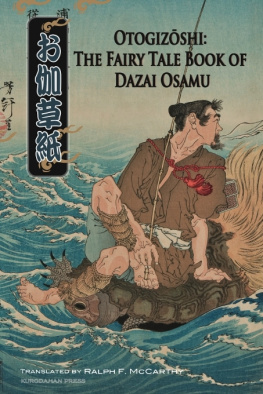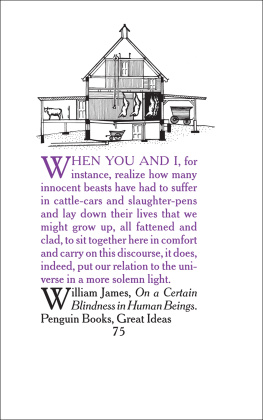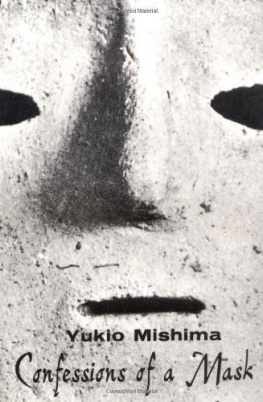Translator's Introduction
I think that Osamu Dazai would have been gratified by the reviews his novel The Setting Sun received when the English translation was published in the United States. Even though some of the critics were distressed by the picture the book drew of contemporary Japan, they one and all discussed it in the terms reserved for works of importance. There was no trace of the condescension often bestowed on writings emanating from remote parts of the world, and for once nobody thought to use the damning adjective "exquisite" about an unquestionably Japanese product. It was judged among its peers, the moving and beautiful books of the present generation.
One aspect of The Setting Sun puzzled many readers, however, and may puzzle others in Dazai's second novel No Longer Human: the role of Western culture in Japanese life today. Like Yozo, the chief figure of No Longer Human, Dazai grew up in a small town in the remote north of Japan, and we might have expected his novels to be marked by the simplicity, love of nature and purity of sentiments of the inhabitants of such a place. However, Dazai's family was rich and educated, and from his childhood days he was familiar with European literature, American movies, reproductions of modern paintings and sculpture and much else of our civilization. These became such important parts of his own experience that he could not help being influenced by them, and he mentioned them quite as freely as might any author in Europe or America. In reading his works, however, we are sometimes made aware that Dazai's understanding or use of these elements of the West is not always the same as ours. It is easy to conclude from this that Dazai had only half digested them, or even that the Japanese as a whole have somehow misappropriated our culture.
I confess that I find this parochialism curious in the United States. Here where our suburbs are jammed with a variety of architecture which bears no relation to the antecedents of either the builders or the dwellers; where white people sing Negro spirituals and a Negro soprano sings Lucia di Lammermoor at the Metropolitan Opera; where our celebrated national dishes, the frankfurter, the hamburger and chow mein betray by their very names non-American origins: can we with honesty rebuke the Japanese for a lack of purity in their modern culture? And can we criticize them for borrowing from us, when we are almost as conspicuously in their debt? We find it normal that we drink tea, their beverage, but curious that they should drink whiskey, ours. Our professional decorators, without thinking to impart to us an adequate background in Japanese aesthetics, decree that we should brighten our rooms with Buddhist statuary or with lamps in the shapes of paper-lanterns. Yet we are apt to find it incongruous if a Japanese ornaments his room with examples of Christian religious art or a lamp of Venetian glass. Why does it seem so strange that another country should have a culture as conglomerate as our own?
There are, it is true, works of recent Japanese literature which are relatively untouched by Western influence. Some of them are splendidly written, and convince us that we are getting from them what is most typically Japanese in modern fiction. If, however, we do not wish to resemble the Frenchman who finds the detective story the only worthwhile part of American literature, we must also be willing to read Japanese novels in which a modern (by modern I mean Western) intelligence is at work.
A writer with such an intelligenceDazai was onemay also be attracted to the Japanese traditional culture, but it will virtually be with the eyes of a foreigner who finds it appealing but remote. Dostoievski and Proust are much closer to him than any Japanese writer of, say, the eighteenth century. Yet we should be unfair to consider such a writer a cultural dracin; he is not much farther removed from his eighteenth century, after all, than we are from ours. In his case, to be sure, a foreign culture has intervened, but that culture is now in its third generation in Japan. No Japanese thinks of hie business suit as an outlandish or affected garb; it is not only what he normally wears, but was probably also the costume of his father and grandfather before him. To wear Japanese garments would actually be strange and uncomfortable for most men. The majority of Japanese of today wear modern Western culture also as they wear their clothes, and to keep reminding them that their ancestors originally attired themselves otherwise is at once bad manners and foolish.
It may be wondered at the same time if the Japanese knowledge of the West is more than a set of clothes, however long worn or well tailored. Only a psychologist could properly attempt to answer so complex a question, although innumerable casual visitors to Japan have readily opined that under the foreign exterior the Japanese remain entirely unlike ourselves. I find this view hard to accept. It is true that the Japanese of today differ from Americansperhaps not more, however, than do Greeks or Portuguesebut they are certainly much more like Americans than they are like their ancestors of one hundred years ago. As far as literature is concerned, the break with the Japanese past is almost complete.
In Japanese universities today the Japanese literature department is invariably one of the smallest and least supported. The bright young men generally devote themselves to a study of Western institutions or literature, and the academic journals are filled with learned articles on the symbolism of Leconte de Lisle or on the correspondence of James Knox Polk. The fact that these articles will never be read abroad, not even by specialists in Leconte de Lisle or James Knox Polk, inevitably creates a sense of isolation and even loneliness among intellectuals. Some Japanese of late have taken to referring to themselves as "the orphans of Asia," indicating (and perhaps lamenting) the fact that although Japan has become isolated from the rest of Asia, the Western nations do not accept her literature or learning as part of their own. The Japanese writers of today are cut off from Asian literature as completely as the United States is from Latin American literature, by the conviction that there is nothing to learn. This attitude may be mistaken, but I remember how shocked a Japanese novelist, a friend of mine, was to see his own name included on a list of Lebanese, Iraqi, Burmese and miscellaneous other Asian writers who had been sponsored by an American foundation. He would undoubtedly have preferred to figure at the tail end of a list of Western writers or of world writers in general than to be classed with such obscure exotics.
We might like to reprimand the Japanese for the neglect of their own traditional culture, or to insist that Japanese writers should be proud to be associated with other Asians, but such advice comes too late: as the result of our repeated and forcible intrusions in the past, Western tastes are coming to dominate letters everywhere. The most we have reason to expect in the future are world variants of a single literature, of the kind which already exist nationally in Europe.
No Longer Human is almost symbolic of the predicament of the Japanese writers today. It is the story of a man who is orphaned from his fellows by their refusal to take him seriously. He is denied the love of his father, taken advantage of by his friends, and finally in turn is cruel to the women who love him. He does not insist because of his experiences that the others are all wrong and he alone right. On the contrary, he records with devastating honesty his every transgression of a code of human conduct which he cannot fathom. Yet, as Dazai realized (if the "I" of the novel did not), the cowardly acts and moments of abject collapse do not tell the whole story. In a superb epilogue the only objective witness testifies, "He was an angel," and we are suddenly made to realize the incompleteness of Yozo's portrait of himself. In the way that most men fail to see their own cruelty, Yozo had not noticed his gentleness and his capacity for love.

